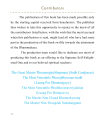self-sustaining happiness : ค้นหาหนังสือธรรมะ หน้า 15 / 45
หน้าหนังสือทั้งหมด

68
The Virtue of Absorbing in the Velama Sutta
68
The Virtue of Absorbing
7. Velama Sutta
"If one were to feed one non - returner, that would be more fruitful than... if one were to feed 100 oncereturners.
"If one were to feed one arahant, that
In the Velama Sutta, the text highlights the profound impact of offering food to individuals with high spiritual attainment. It asserts that feeding a single non-returner yields greater merit than fee

44
Qualities of a Stream-Attainer in Buddhism
mentioned in the canon.40
The title ‘son of the Blessed one’ suggests that, through the
Buddha, the person was (re)born to the same plane (bhūmi) to which
the Buddha belongs, i.e., passing beyond the
This text delves into the characteristics of a Stream-attainer, identified as a noble disciple who is reborn to a transcendental plane through the Buddha's teachings. Key qualities include association

195
Understanding the Three Characteristics of Buddhism
Characteristics (tilakkhana), consisting of impermanence
(aniccata), suffering (dukkhata), and non-self (anattata). This
truth stands behind all living beings in this world.
The truths of the Law of K
This text explores the Three Characteristics of Buddhism—impermanence, suffering, and non-self. It discusses how misconceptions among children regarding Buddhist teachings and monks can hinder their u

182
Contributors and the Gift of Dhamma
CONTRIBUTORS
sabbadānam
dhammadānam jināti
The gift of Dhamma excels all other gifts
Dhammapada verse 354
The publication of this book has been made possible
only by the starting capital received from
The publication of this book is made possible by the support from benefactors. The publisher appreciates the contributions listed, wishing that the merit from reading this book leads all involved towa

82
Contributors to the Dhammakaya Publication
Contributors
The publication of this book has been made possible only
by the starting capital received from benefactors. The publisher
thus wishes to take this opportunity to rejoice in the merit of a
This section acknowledges the benefactors and contributors whose support made the publication possible. The production team dedicates the merit of this book to the Supreme Self-Enlightened One and var

14
Understanding Karma and Human Behavior
Introduction
of our actions having brought this suffering of disharmony into our lives and seek to address the causes that are creating and accumulating bad karma. And our accumulated karma designate
This text delves into the impact of our actions on accumulating karma and the subsequent effects on our lives and rebirth. It outlines the ten bodily conditions we face as we navigate life and the nec

92
Buddha's Teachings on Patience and the Eight Precepts
"First, we must try to go to them indirectly. Do you see? We will only be here for seven days so we must be patient. We should always train ourselves to speak kindly and by doing this, we will gain bi
This text emphasizes the significance of patience and kindness according to Buddha's teachings during a week of meditation while following the eight precepts. It highlights the importance of good mann

61
Understanding Dhammakaya Knowledge
The Dhammakaya Knowledge is taught by the Buddha to constitute the transcendental, blissful, eternal, and pure Self of the Buddha. Dhammakaya doctrines can be found in the scriptures of all major Budd
Dhammakaya Knowledge is a profound teaching from the Buddha that emphasizes the transcendental, blissful, and pure nature of self. This concept is integral to all major Buddhist schools, including The

42
Saddhā: The Criterion of Being the Tathāgata's Son
Saddhā: Criterion of being the Tathāgata's Son
The first point to be looked at is the criterion of being the Buddha’s ‘true son’ which is, in this passage, defined by means of his
irremovable confiden
This text discusses the criterion of being the Tathāgata's son, emphasizing the irremovable confidence (saddhā) in the Buddha. It defines this confidence as settled and unchangeable despite external i

15
Understanding the Role of Precepts in Buddhist Ordination
There are 227 precepts, which include rules, regulations, and traditions that serve as guidelines for those who are ordained. The precepts are tools that help define the differences between right and
The 227 precepts provide rules and guidelines for the ordained, defining right and wrong to help individuals strengthen their determination amidst life's challenges. They ensure that knowledge gained

37
Family Life Principles
Part One: Family Life
1. Giving (dana): Loving and living together requires
sharing. Where there is no giving, the atmosphere
feels very unpleasant. Sharing encompasses sharing
of problems, too. When
This text discusses four fundamental principles for enhancing family life: 1. Giving (dana) emphasizes the importance of sharing, including sharing problems to foster support. 2. Polite speech (piyava

126
Truth for the Family: The Impact of Good Deeds
Part Five: Truth for the Family
that good deeds will always bring favorable outcomes and
vice versa.
Important to Remember:
1. The first stage of good deeds: When we have done
something good, even if
Part Five of the text discusses the importance of good deeds within a familial context. It details four stages of good deeds: self-satisfaction from the initial act, the development of a virtuous pers

145
Truth and Self-Discipline for Families
Part Five: Truth for the Family
4. By nature, humans will not lie. People should
always speak the truth. They should always be honest
and sincere to one another. Imagine if we find out
that the people
This text emphasizes the natural inclination of humans towards honesty and the importance of addressing any dishonesty in relationships. It discusses the detrimental effects of intoxicants on one's co

98
The Importance of Humility and Self-Control
153. DON’T LOSE SELF-CONTROL
Keen arrogance out of your heart, even if you think you know better than others. Be humble and patient.
Your teachers and elders have only good intentions for you. Remembe
This text emphasizes the significance of maintaining humility and self-control in personal development and working with others. It warns against arrogance and promotes a patient, ego-less attitude to

22
Understanding the First Noble Truth
-- The First Noble Truth states that all conditioned existence is characterized by suffering or unsatisfactory condition.
-- Suffering exists. Birth, aging, sickness, death, discontentment, disappoint
The First Noble Truth explains that all conditioned existence is marked by suffering. This suffering encompasses various forms such as birth, aging, illness, and death. Essential concepts like attachm

68
Case History of the Success of Moral Training
CASE HISTORY OF THE SUCCESS
OF MORAL TRAINING
W O R L D P E A C E
The G O R M
i n n e r P E A C E
CONFORMITY TO AHEAD REGULATIONS
X
ACCEPTANCE OF CRITICISM
X
PUNCTUALITY
X
This text discusses the significance of moral training in achieving success and promoting both world peace and inner peace. It emphasizes the necessity of conforming to regulations, accepting criticis

63
Understanding Paccekabuddhas in Buddhist Philosophy
V. Reference 2: Dhammakāya and Paccekabuddhas
A Paccekabuddha is counted as one of the two types of Buddhas. According to Buddhist philosophy, a Paccekabuddha is a person who is of the highest wisdom
This text discusses the concept of Paccekabuddhas, individuals of high wisdom who achieve self-enlightenment but lack the ability to teach. It explores scholarly arguments about the pre-Buddhist origi

9
Dhamma for Laypersons: The Vital Heart of a Stable Family
The following is the extracted text from the image:
---
The following subject matter is very important for all families; whoever wants to get married, whoever wants to have children, whoever wants t
Understanding family dynamics is essential for those looking to marry or raise children. This text emphasizes the importance of Dhamma for Laypersons, outlining four critical elements: truthfulness, s

81
Dhammadayada Training Programme
Trainees who pass the months training will qualify for the mass ordination, which lasts for another month. This last month of Dhammadayada training programme focuses on establishing the understanding
The Dhammadayada training programme offers an enriching experience where trainees who successfully complete the months of training qualify for mass ordination. This unique program emphasizes self-trai

198
Understanding Your Mind for Serenity
If you do not know your own mind, how will serenity arise?
The responsibilities of daily life are constantly pulling your mind to attach with external forces to you because you are fixated on your ex
The text discusses the importance of self-awareness and understanding one's mind as essential steps toward achieving serenity. It highlights how external factors like daily responsibilities and politi
